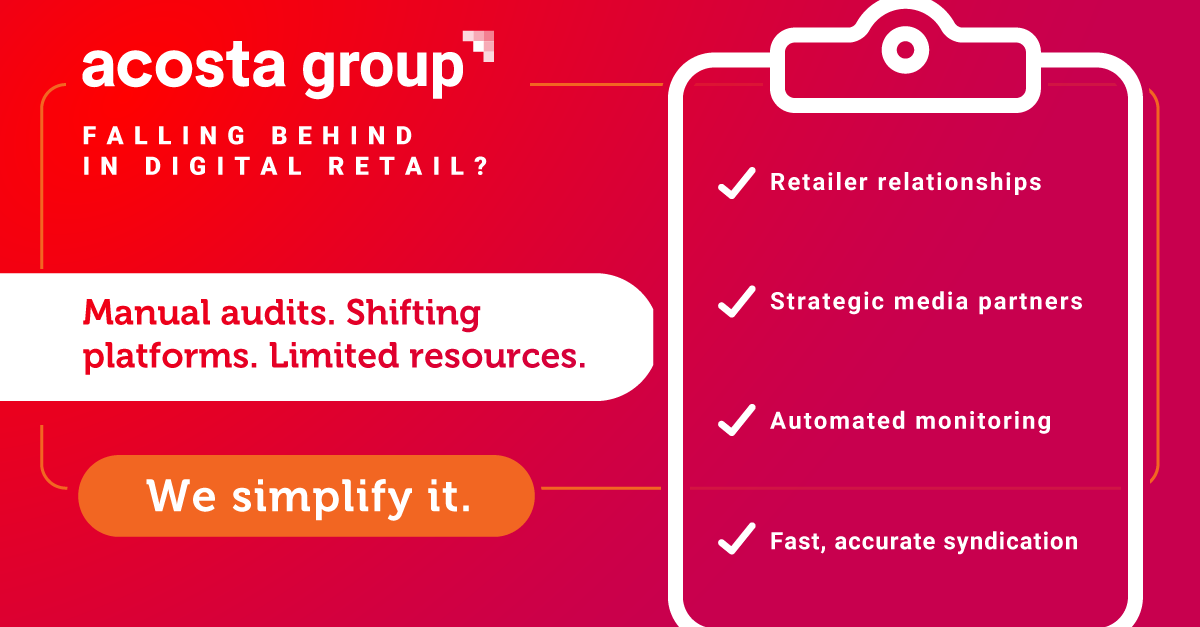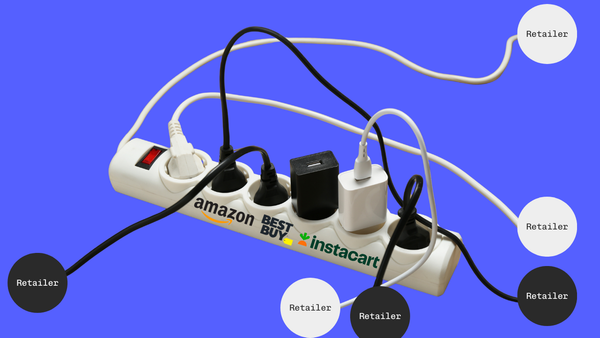2 Ways Retailers Can Compete In An AI-Enabled Shopping Future
What happens to a retailer's data advantage when AI platforms like ChatGPT start processing transactions? Perhaps the answer isn't as bleak as you might think.

I'm a huge podcast junkie, and I've started this series sharing 'snips' of other podcasts with you—my personal highlights from episodes I found particularly valuable, plus some commentary of my own.
This edition comes from a crossover episode between Commerce Media Matters (where I was a guest a couple months back) and a new podcast called Mind the Model, which I'll definitely be subscribing to. The conversation got deep into the weeds of traditional publishing, which I enjoyed as an outsider, but the snips I selected tackle one of the most critical questions as we look ahead to an AI-enabled shopping future: what happens to a retailer's data advantage when AI platforms like ChatGPT start processing transactions? Perhaps the answer isn't as bleak as you might think.

How Retailers Can Compete #1, Deeper Transaction Data
When OpenAI announced you could actually buy stuff through ChatGPT—from Walmart, Etsy, Shopify—retailers started worrying. If people shop and checkout without ever touching your website, what happens to all that precious first-party data?
Emmalee Crellin, Head of Data Sales at Australia's oOh!media (A DOOH media company) raised the core tension: both OpenAI and the retailer would hold the transaction data since it happened on OpenAI's platform but the retailer recognizes the revenue. "So now you have two distinct companies holding the thing that is so valuable, which is first party data," she noted. "What does that do to the future of retail media networks?"
Paul Blackburn, Chief Growth officer at Vudoo, an ad-tech company, was optimistic. He acknowledged it "rebalances the power" since OpenAI gains a view across multiple retailers like Etsy, Shopify, and Walmart—a pretty powerful proposition. But he argued retailers aren't losing ground: "The retailer is still seeing the transaction data too... Walmart will see the transactions that happen inside the GPT. Right now, that's a blind spot for them. They're not seeing anything—just referrals. They're gonna get the prompt engineering that triggered the transaction and other bits and pieces."
My take: Paul has a more optimistic take on this than me.
Paul argues that Retailers are gaining valuable new data they never had before. Right now, ChatGPT traffic is a black box—just referrals with no context. With instant checkout integration, retailers suddenly see the prompts, the AI's reasoning, and the complete decision path. Perhaps even richer insight than a standard keyword search. Retailers aren't losing power—they're gaining new signals to strengthen their position.
My argument, which I shared last week in "While We Debate What's 'Really' Agentic, Retail Media's Foundation Is Already Shifting," is that retailers are likely to lose their most valuable asset (when it comes to offsite retail media at least): data exclusivity. Even if they see transaction data from ChatGPT checkouts, the damage is done—OpenAI now has cross-retailer purchase signals that used to belong exclusively to individual retailers. This shared visibility erodes the data moat that justified those ~40% margins on off-site advertising. The new prompt data retailers gain doesn't compensate for losing their exclusive competitive advantage.
Now, my argument presupposes that ChatGPT will enter the audience extension game, which I think is highly likely in the medium-term but is by no means a certainty. Without that assumption, Paul's optimism makes sense: If OpenAI just processes transactions but doesn't monetize the cross-retailer data through advertising, then retailers ARE gaining new signals (prompts, context) without losing their competitive moat.
Acosta Group’s retailer intimacy is legendary—merchants answer their calls. You're not going to find that access at the same scale with any other partner out there. That expertise with both retailers and shoppers fuels its Connected Commerce team, which offers digital shelf, retail media, and data analytics all under one roof. Tap into 100 years of retailer relationships and award-winning digital commerce capabilities. Learn more at Acosta.Group
How Retailers Can Compete #2, The Content Play
Later in the conversation, Paul offered a tactical example of how retailers can differentiate themselves in an AI-dominated shopping landscape.
Later in the conversation, Paul offered a tactical example of how retailers can differentiate themselves in an AI-dominated shopping landscape. His key point: "Retail media has got to learn how to enable brands to show up in their media... It's very transactional. It's very like a listing. It doesn't allow for a brand to communicate their values like a publisher site does."
When Nathan asked who's doing it well, Paul pointed to Chemist Warehouse and their House of Wellness brand: "They actually publish great consumer content... it also sits within Body and Soul, which is a NewsCorp website." He noted they rely on Medium Rare—"ex journalists, ex magazine, ex digital content producers to do it because retailers don't do lifestyle content very well. They think like a retailer."

My take: The Chemist Warehouse example is spot-on. Instead of just competing on price, they built House of Wellness—a proper content brand with print magazines (they distributed 51 million copies last year), digital content, and partnerships with premium publishers like News Corp's Body+Soul.
The real win is what Paul said—they positioned themselves as a wellness authority, not just a discount pharmacy.
This is a great concept retailers could consider as they try to build a retail media platform that is differentiated and stands up to headwinds from agentic commerce. AI can recommend products all day long, but it can't build the kind of trusted relationship that comes from expert-authored, quality content. Own the content, own the audience, own the data. And when you partner with brands, you've got something real to offer beyond just another ad slot.
And Finally, Perhaps AI Advertising Could Be A Fresh Start?
Outside of the advantages that retailers could lean into in an agentic commerce future, another part of the conversation that stuck with me is the idea that we might actually get advertising right this time around. Paul's hope is "that OpenAI does it better than that. And that we reinvent what ads are that are a bit more friendly... it's a once in a lifetime opportunity to clean up some of the things that we did wrong with the first advertising phase of the internet."
Emily built on this, noting AI platforms could deliver especially tailored advertising because "they know so much about you in the context of who you are."
But Nathan Guerra, co-founder of dev tool TestChimp, pushed back with the realist take, drawing on his 12 years running agency partnerships at Google: "You start off very simple and then there's an opportunity to make more money by adding another ad spot, by adding another ad spot, and shareholders want more value. And so that just becomes start soft clean and gets more and more cluttered over time. Exactly what you'll see with ChatGPT."
My take: I love Paul's optimism here, even though Nathan may be right about what'll actually happen. This tension is exactly where we are right now.
The promise is alluring. AI platforms know context in ways Google search never could. They understand what you're actually trying to do, your preferences, the whole conversation. That should mean ads that feel helpful instead of annoying. These platforms have a shot at building helpfulness into the business model from day one.
The Bottom Line
What I liked about this conversation is that it wasn't doom and gloom. Retailers aren't helpless here. They're getting new data they didn't have before. They have a chance to help shape what advertising looks like in AI. And they can build real differentiation through content and physical presence.
Read more from me on related topics:






